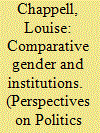| Srl | Item |
| 1 |
ID:
096294


|
|
|
|
|
| Publication |
2010.
|
| Summary/Abstract |
A comparative politics of gender offers an opportunity to consider in detail the operation of gender within political institutions. As such, it contributes to a deeper understanding of the roles and experiences of men and women within political institutions, of the policies, laws and norms that are the outcomes of these institutions, and of the relationship between these institutions and social actors. This essay proposes a multi-directional strategy for undertaking comparative gender and institutional research that includes taking account of similarities and differences within and across states, between states and international institutions, across space as well as across time. It argues that through this research strategy it is possible to gain a more nuanced understanding of gender processes and outcomes, which is valuable to those working both inside and outside political institutions to advance a women's equality agenda.
|
|
|
|
|
|
|
|
|
|
|
|
|
|
|
|
| 2 |
ID:
130970


|
|
|
|
|
| Publication |
2014.
|
| Summary/Abstract |
Many conflicts in the Asia-Pacific region have included sexual violence crimes targeted primarily against women. However, in comparison to other regions, Asia-Pacific states have been reluctant to embrace international law innovations to end impunity for such crimes into the future, as evidenced by their unwillingness to become signatories to the Rome Statute of the International Criminal Court. Of the 39 countries constituting the Asia-Pacific region, only 17-less than half-have joined the Rome Statute. This article initially surveys some of the reasons for non-ratification of the Statute. It further examines the role of civil society and the potential normative impact of the Statute to enhance national sexual violence legislation and prosecutions. Finally, it identifies some practical steps that the Australian government could take to encourage regional states to ratify, implement and enforce the Rome Statute in order to further protect all victims of international crimes and bolster the broader Women, Peace and Security framework.
|
|
|
|
|
|
|
|
|
|
|
|
|
|
|
|